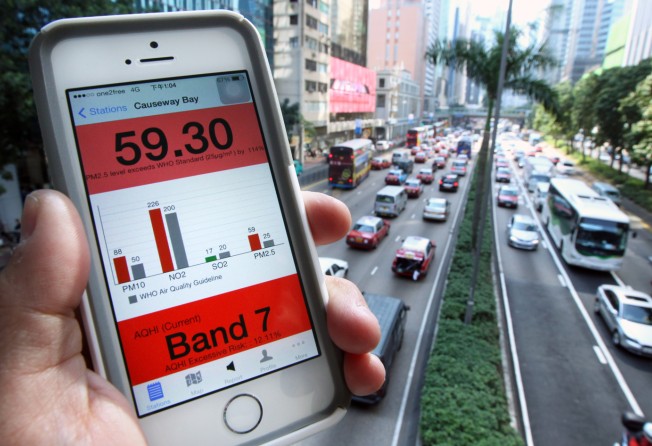For cleaner air, marine emissions should be Hong Kong's next target
Kwong Sum Yin says this year's tougher standards are a good start

The long-anticipated tougher air quality standards are finally in effect in Hong Kong, acting as a benchmark for assessing the impact new development projects will have on air quality. Although the new air quality objectives fall short of World Health Organisation recommended levels, it is still a change for the better.
Another breakthrough has been the introduction of the air quality health index to more accurately track pollution levels and alert the public to the health risks.
Meanwhile, last month, the Legislative Council passed the amendment to the Air Pollution Control (Air Pollutant Emission) (Controlled Vehicles) Regulation to phase out old, polluting diesel commercial vehicles. The result may take some time to show, but it is undoubtedly a strong policy that will help the city reduce its roadside emissions.
So the past year has marked a number of milestones for air policy in Hong Kong. Yet people are still unhappily gazing up and seeing our city shrouded in smog, more aware now than ever of the terrible health consequences of pollution. Only last October, the WHO classified air pollution as a cause of cancer, signifying the attention for action it deserves.
It's now time for the Hong Kong government to step up its efforts. Cargo and passenger marine vessels in our waters have become the biggest source of sulphur dioxide and respirable suspended particulate emissions, according to the 2011 data in the government's Air Pollutant Emission Inventory report. There must be no delay in tightening the cap on the sulphur content of locally supplied marine diesel and requiring ocean-going vessels to switch to low-sulphur fuel while at berth.
In the long run, an emission control area should be set up in the waters of the Pearl River Delta.
In addition, dozens of cruise ships are scheduled to berth at Kai Tai Cruise Terminal this year. Emissions at the terminal will increase very quickly, threatening the health of the people in East Kowloon. To minimise such pollution in the port area, facilities to allow cruise ships to plug into the grid need to be built as soon as possible.
The chief executive said in his 2013 policy address that the government would provide funding to install such facilities, and it is definitely high time for the Commerce and Economic Development Bureau to expedite the installation of onshore power facilities.
As for roadside pollution, we should also be looking at the problem at source. The growth of vehicles needs to be curbed and inspection and maintenance needs to be tightened.
A sustainable transport policy should be the way forward. Our government has to shift from primarily evaluating carrying capacity to a mindset of taking into serious consideration all the environmental, social and economic costs that our transport systems pose.
We just have to look across the border to see the price of failing to act.
There is a limit to pursuing economic growth at all costs before our environment and health are on the line; and while it may take a mere few years to do the damage, a remedy may take decades.
Last year, we saw a glimpse of hope, with the administration demonstrating a change in attitude with renewed competence in dealing with the problem. We hope that tougher, more innovative measures to tackle our polluted air are in the pipeline. The people of Hong Kong are longing for a breath of fresh air. With more political will, that change may not take too long to come.
Kwong Sum Yin is the chief executive officer of the Clean Air Network